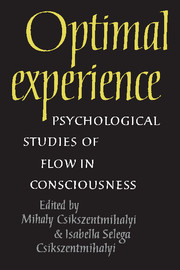Book contents
- Frontmatter
- Contents
- Acknowledgments
- Contributors
- I A THEORETICAL MODEL OF OPTIMAL EXPERIENCE
- II VARIETIES OF THE FLOW EXPERIENCE
- III FLOW AS A WAY OF LIFE
- 11 Introduction to Part III
- 12 Modernization and the changing contexts of flow in work and leisure
- 13 Ocean cruising
- 14 Flow in a historical context: the case of the Jesuits
- IV THE MEASUREMENT OF FLOW IN EVERYDAY LIFE
- References
- Name index
- Subject index
14 - Flow in a historical context: the case of the Jesuits
Published online by Cambridge University Press: 05 June 2012
- Frontmatter
- Contents
- Acknowledgments
- Contributors
- I A THEORETICAL MODEL OF OPTIMAL EXPERIENCE
- II VARIETIES OF THE FLOW EXPERIENCE
- III FLOW AS A WAY OF LIFE
- 11 Introduction to Part III
- 12 Modernization and the changing contexts of flow in work and leisure
- 13 Ocean cruising
- 14 Flow in a historical context: the case of the Jesuits
- IV THE MEASUREMENT OF FLOW IN EVERYDAY LIFE
- References
- Name index
- Subject index
Summary
For about two centuries after its founding in 1540, the Jesuit order of the Roman Catholic Church played a leading role in the religious and political history of Europe, and through its far-flung and energetic missions it was instrumental in the development of European influence in the rest of the world, particularly the Americas and the Far East. During its heyday, the order spread very quickly through Italy, Portugal, France, and Spain and into Central and Eastern Europe, attracting some of the most brilliant and ambitious young men of that day to its ranks. By 1556, when St. Ignatius of Loyola died, some 1,000 Jesuits were already working throughout Europe as well as in Asia, Africa, and the New World. Their number increased to 15,544 in 1626 and to 22,589 by 1749.
The question addressed in this chapter is, Why was this particular monastic order so successful during the 1500s and 1600s? Obviously one could cite many causes suggested by a materialist approach to history and list various economic, social, and political reasons for the Jesuits' influence. Important as such “extrinsic” causes may have been, a historical event also requires a psychological explanation. Impersonal historical forces must be translated into ideas and emotions before they can systematically affect human action. A psychological explanation should account for the role of intrinsic motivation, because given the opportunity, people tend to select differentially those courses of action that provide the most positive experiences.
- Type
- Chapter
- Information
- Optimal ExperiencePsychological Studies of Flow in Consciousness, pp. 232 - 248Publisher: Cambridge University PressPrint publication year: 1988
- 9
- Cited by



